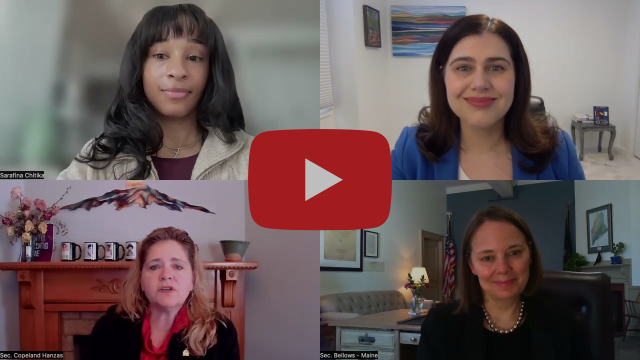FOR IMMEDIATE RELEASE
04/10/25
WASHINGTON: Today, Secretaries of State Shenna Bellows (ME), Sarah Hanzas (VT), and Jena Griswold (CO) joined DASS to warn all Americans about the dangerous implications of the SAVE Act.
As the SAVE Act passed the House, three Democratic Secretaries of State held a virtual press conference and spoke on the dangerous legislation – and how it would lead to the disenfranchisement of millions of voters, including married women, rural communities, and voters of color.

Watch the full conference here.
Read more from the Democratic Secretaries of State below:
Colorado Secretary of State Jena Griswold: “This measure will not save anything. In fact, it does the opposite – it silences eligible American voters, especially women and people of color.
[…]
Let’s be clear – millions of Americans could be disenfranchised by House Republicans and Donald Trump. Losing your driver’s license or birth certificate, letting your passport expire, or even getting married and taking your partner’s last name could all prevent a voter from making their voice heard in free and fair elections, if the SAVE Act passes. Replacing just one of those documents, let alone multiple documents that would be needed to register, takes time and money that not every American has. Women who are citizens – who are eligible to vote – should not be stopped at the ballot box by Mike Johnson and Donald Trump.”
Maine Secretary of State Shenna Bellows: “Make no mistake – all of us agree that citizens and only citizens should be voting in our federal elections. Already, we have well-constructed checks and balances to make that happen. The SAVE Act is a hasty power grab to allow politicians to choose their votes instead of voters choosing their elected leaders.
Vermont Secretary of State Sarah Hanzas: “The SAVE Act is really a dangerous step and it’s a step in absolutely the wrong direction. To be very straightforward and candid – this bill will disenfranchise women. It will disenfranchise many different groups of eligible voters.”
[…]
“It will also disadvantage rural voters, voters who live in one rural community but work half an hour, forty-five minutes away in another. It will disadvantage people who have lost their documents due to natural disasters. And it’s really unconscionable to think that we would disenfranchise someone for not having those documents.”
